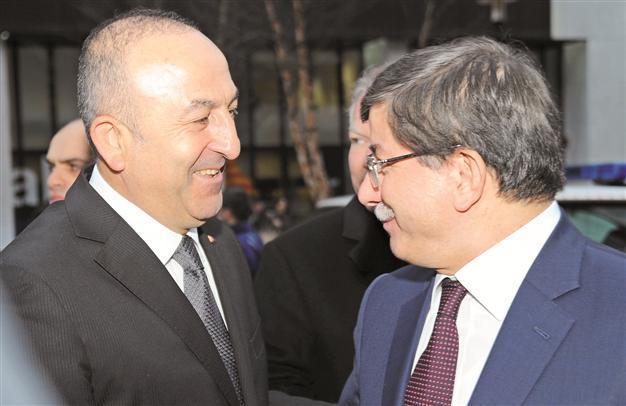EU concerned over new Internet bill
BRUSSELS

Turkish Foreign Minister Ahmet Davutoğlu (R) and EU Minister Mevlüt Çavuşoğlu are seen before their meeting with EU officials in Brussels Feb 10. AA photo
The European Union has expressed concerns over Turkey’s new Internet bill that has sparked criticism from both the opposition and actors abroad, following a meeting with Turkish ministers in Brussels.
EU foreign policy chief Catherine Ashton and Enlargement Commissioner Stefan Füle met with Foreign Minister Ahmet Davutoğlu and EU Minister Mevlüt Çavuşoğlu for political dialogue and discussed the recent developments, including the Internet law and judicial changes after the recent graft probe.
“We have underlined the need for Turkey as a candidate country in accession negotiations to engage in early consultations with the commission on all laws related to both the accession process and the political criteria,” Füle said in a written statement after the meeting. “We discussed this in particular in the light of the recent exchanges on the importance of an independent judiciary and the Internet law adopted by the Parliament last week. It is the commission’s duty to monitor the developments and express concerns when these are justified and to also offer help and support to ensure compatibility with the acquis and EU best practice,” the EU commission said.
Prime Minister Recep Tayyip Erdoğan rejected criticism of the new curbs, saying the new regulations did not impose any censorship at all on the Internet but would conversely make it safer and freer. Critics say the new law is an attempt by Erdoğan to stifle dissent and stop evidence of high-level corruption being seen online.
“In this context, with regard to the Internet law, the commission agreed to share in writing a number of the concerns identified, regarding both compatibility with the acquis and EU best practices,” Füle said, in a veiled warning to Turkish government.
Last week, European Parliament chief Martin Schulz called the moves a “step back into an already suffocating environment for media freedom,” while Washington also expressed misgivings.
Füle’s spokesman, Peter Stano, said a press conference slated after the meeting was canceled due to a lack of time as a “productive discussion” with the Turkish side took longer than planned.
